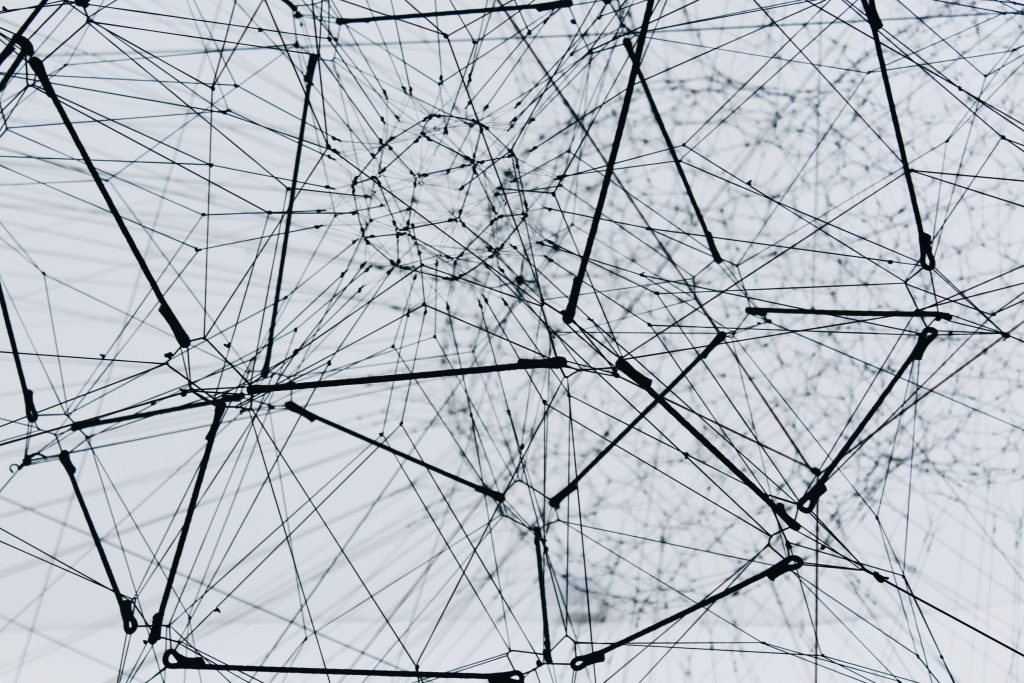How Understanding the Brain Teaches Me to Love God Better
Want to play a game of “never have I ever?” Here goes. Never have I ever been told to study basic brain functions when I want to know how to grow in my spiritual life. Is that shocking to you? Probably not.
And yet, I wholeheartedly (or, whole brain-edly) believe that how we relate to God changes with a basic understanding of how the brain creates neural networks as a function of our experience. Before I get to that specific claim, let me back up a bit.

Your brain is responsible for your engagement with the world. What you see, feel, think, remember, and do is all contingent on your brain processing. Engaging in the world—whether it be zoned out in front of the 1,732nd TikTok video for the day or reciting Shakespeare in Stamps Courtyard—changes your brain. Your brain is constantly changing in response to huge amounts of incoming information from the external world. Many of these changes are temporary. Consider this example: you read something from a textbook, think you know it, and then fail to remember it come test time. What happened? The temporary brain change from the reading did not result in long-term reorganization/creation of the neural networks for the memory of the thing you read; that’s what happened. What studying does (especially effective studying), is that it takes that temporary brain change and slowly makes it permanent. An analogy I like to use is a comparison to creating a path through a forest. At first, there is no path. But, if you travel the same path every day, cutting away obstructive branches, compacting the ground beneath your feet, eventually a path is born. Think of the creation of neural connections in your brain as doing the same thing1. With enough practice, the pathway is born and the brain change is more than temporary.

William James, a pioneer of early psychology, wrote that “my experience is what I agree to attend to.” If we think about this from a brain-based perspective, this is true because what we attend is the thing that is ultimately burned into our ever-forming neural circuitry. Attention changes what happens in our brain (something called neuromodulation); it is the gate keeper to neural network activation and creation.
So, when Scriptures tell us to think on what is true, honorable, pure, lovely, and good, to think on what is excellent and worthy of praise in Philippians 4:8, this is not just a platitude to “think happy thoughts.” I think that Paul is pointing us to focus on these things because what we pay attention to changes us. Luke 6:43-45 records Jesus teaching that we are recognized by our fruit, fruit that is the overflow of our hearts. He says that a good man brings good things stored out of his heart whereas an evil man brings forth the evil stored in his heart. Out of the overflow of the heart, the mouth speaks.
So, what does this have to do with the neuroscience of attention? As I see it: everything.

The objects of our attention cause brain change. These brain changes reflect and represent the objects of our attention in the form of new neural networks. These neural networks, like the well-travelled path through the forest, work to increase the ease of which our brain can assess and make sense of an object of attention. In the forest, the path makes it easier to access the destination of the path within the forest. In our brains, the neural networks make it easier to remember and think about the object of our attention. So, when you look at your best friend’s face, you recognize them because the neural network that is the memory of their face (created from previous attention) is activated (the path is “travelled”).
Yet, when the objects of our attention cause brain change, it’s not just that we now “have a new memory.” It is something significantly more meaningful. That neural network now serves as a foundational network when your brain is trying to make sense of new information. Your brain is making constant calculations about what you will like, what you should say, what you might feel based on your previous experiences recorded in neural networks. Attention in and to these previous experiences is what creates these networks. Thus, every new experience we have is shaped, influenced, and interpreted through the lens of the neural networks created from our previous attention. This serves as the foundation for meaning making; our pre-existing beliefs, knowledge, expectations, desires (etc.) that we use to make sense of what is in front of us is, in part, driven by what we’ve previously attended to. Said directly, the brain we are creating today (out of our attention) is the filter through which we will make sense of all future experiences.

Researchers refer to the influence of what is already present in our heads on the meaning-making process of the moment as a “top-down influence.” This is how two people can look at the exact same stimuli and see different things. Remember the dress? Or Laurel/Yanni? These are all so interesting (and frustrating) because they illustrate the incredible power of top-down influences in how we make sense of the world. What we previously paid attention to shapes our brain to make sense of whatever might come next. This is efficient, but there are important real-world implications. This includes implications for our spiritual life because when we focus our attention on what is less than what we have been commanded to in Scripture, it has long-lasting implications for how we subsequently direct our attention and interpret the objects of that attention.
So, how we spend our time – the focus of our attention – matters beyond the individual moment of attention. We carry in our brains a representation of our previous attention history that serves as a filter for all subsequent interactions in the world.

This is challenging, to be sure. But, importantly, we also worship a God of abounding grace. Neuroscience bears this out as well in a concept known as neuroplasticity. When we choose to re-direct our attention toward what is good, right, and true we, over time, change our brain’s neural networks, a change that is the direct result of the steadfast re-direction of attention.
Dallas Willard wrote that “God does not ordinarily compete for our attention.” If attention is the gateway to the harvest of our heart, I think neuroscience research requires that we seriously ask about the objects of our attention. This is not a call to “look to the bright side of things” or to find that silver lining. I don’t believe that Scriptures call us to bury our heads in the sand instead of confronting problems. And yet, when we encounter problems or challenges, how do we comport ourselves in a manner fitting to our calling? What and to whom do we attend; how do we cultivate the daily habits and neural networks that produce that pleasing aroma of a life lived for Christ?

One reason these questions may be challenging is that they make our small minutes meaningful. The good or the evil in our hearts is not harvested all at once, but rather developed over small, daily habits, habits all starting with our attention. These daily habits might not feel like they are doing much but they are slowly, and powerfully, changing our brains—brains out of which our behaviors flow.
There is always data coming into and being processed by your incredible brain, even if you are not consciously aware of it. From a brain-based perspective, we are always attending to something. So, here’s the big question for you: what are you paying attention to?

Footnote:
- The nerve cells in the brain are called neurons. They are the building blocks of the nervous system and, when they network together (neural networks), they form the foundation of all human functions ranging from the activation required to blink to the experience of love or misery. Your brain, through these neural connections and networks, carries a physical representation of your subjective, lived experience.
A version of this blog was translated into Spanish and published at Coalicion por el Evangelio.

4 Comments
The psalm 119: 15 says
“I will study your commandments
and reflect on your ways.”
Only meditation on the word of God will change the path of our siner hearth.
Hi Andres! I agree; brain science provides one explanation for why meditation on the word of God changes our lives. When we meditate, we are rewiring our way of engaging the world. This is just one explanation (not the only or even necessarily the most significant) for how meditating on the Word of God shapes us to Christlikeness. We are (literally, physically) being changed in our attention to God’s word.
It’s interesting how I can easily remember Tweets or TikTok videos I came across weeks ago, but sometimes struggle with remembering textbook material I read over multiple times. As you mentioned, I believe it has to do with attention. When I’m on social media, I’m engaged, no matter how meaningless what I’m doing/watching is. But when I’m studying, I have the tendency to get distracted and thus, the information isn’t really sticking with me.
One of the best ways to learn is to make things relevant to yourself. If you are just reading something “out there,” it will be easily forgotten. But when you are reading something and then applying it to your own life, fully engaging with it (the same way you do on social media, for example), there is better attention. The thing about social media is that they have invested so much money to fine tuning an algorithm for your attention. Saying no to the continued swipe is actually going against your biology (because social media is so specialized in monopolizing and maintaining your attention). It’s important that we DO say no, but the more we engage, the harder it becomes to resist because it gets burned into how our brain engages with the world (that’s the neuroplasticity idea). A few years ago, I listened to a great podcast on this….you might also find it interesting 🙂 https://www.npr.org/transcripts/574073721